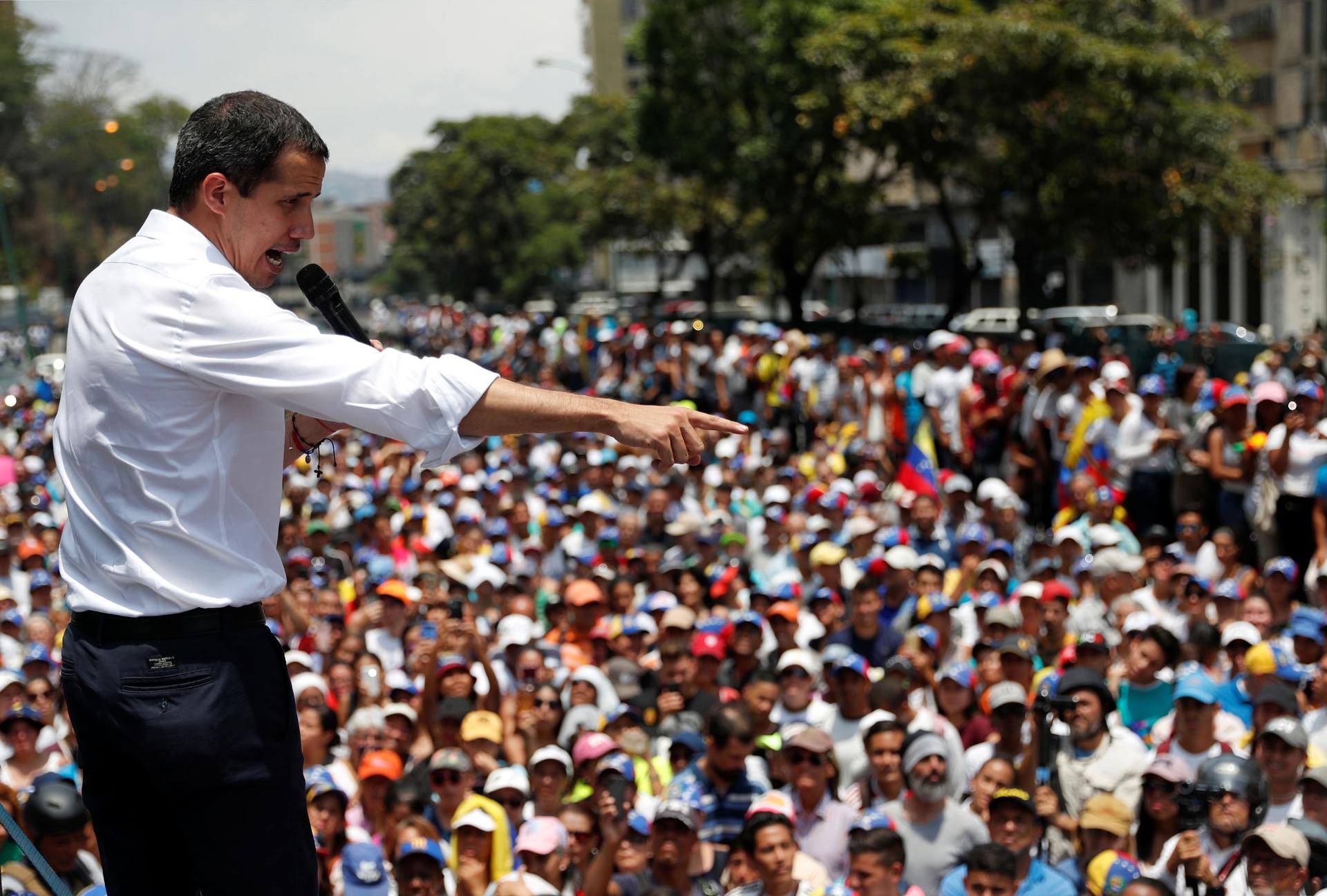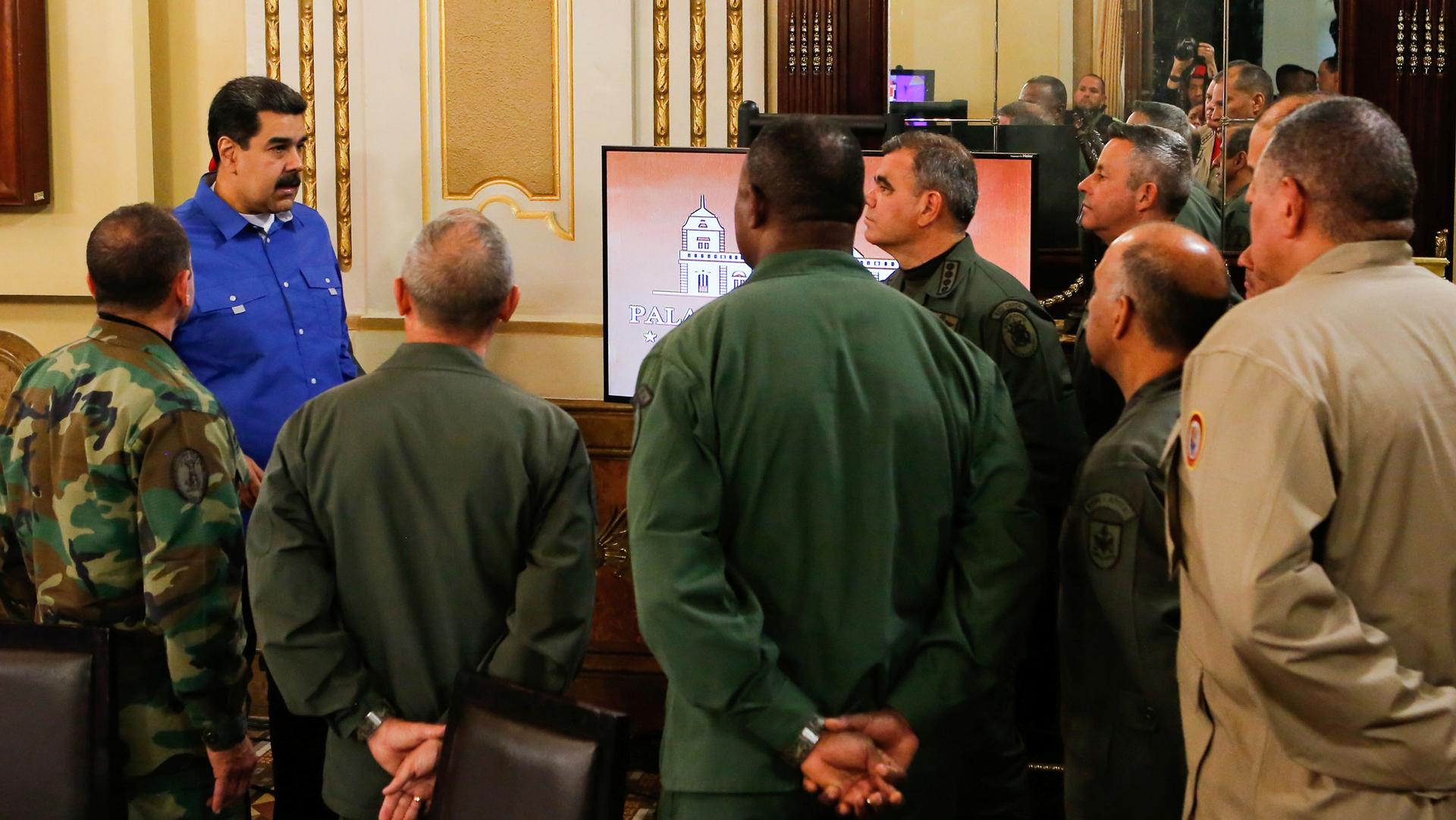Maduro hangs on as Venezuelan protests peter out
Venezuela’s President Nicolás Maduro talks to military high command members during a broadcast at Miraflores Palace in Caracas, Venezuela, April 30, 2019. Miraflores Palace/Handout via Reuters
Despite thousands of Venezuelans who took to the streets on Wednesday to oust President Nicolás Maduro, there signs that the crisis is increasingly a political stalemate.
Guaidó had called for the “largest march” in Venezuela’s history and said on Twitter that “millions of Venezuelans” were in the streets in “this final phase” of his move to oust Maduro.
But by late afternoon, many of the protesters in the capital Caracas had drifted home. National Guards fired tear gas at a hardcore of demonstrators who remained, and one injured demonstrator was carried by others to a first aid truck, Reuters video showed.
Rights organizations said a young woman died in surgery after being shot in the head during a protest in Caracas. Guaido confirmed via Twitter that a woman died after being shot.
The standoff in the South American country increased tensions between the United States and Russia, which accused each other of interference in the OPEC-member nation’s affairs.
Despite Guaidó’s calls for the military to support him, the armed forces leadership has so far remained loyal to Maduro, who has been in power since his mentor, the late President Hugo Chávez, died in 2013.
“If the regime thought we had reached maximum pressure, they cannot even imagine,” Guaidó told thousands of cheering supporters. “We have to remain in the streets.”
It was unclear what more Guaidó can do at this point. The Venezuelan opposition has often staged huge street protests against Maduro but failed to dislodge him despite a deep economic recession and hyperinflation.
Demonstrators said they were prepared for the process of ousting Maduro to last a long time.
“We need to keep going,” said Laila Amezquita, a 52-year-old nurse from Caracas’ downtown Candelaria district. “In three months, Guaido’s been able to do what they have not done in 20 years, and one has to be patient.”
Others are frustrated that nothing has changed more than three months after Guaidó, head of the opposition-run National Assembly, invoked the constitution to assume an interim presidency, arguing that Maduro’s 2018 re-election was illegitimate.
Guaidó is recognized as Venezuela’s legitimate head of state by the United States, the European Union and others, while Maduro is backed by countries including Russia, China and Cuba.

US-Russia friction
Those fault lines are increasingly putting Venezuela at the heart of global geopolitical tensions.
US President Donald Trump’s administration has imposed sanctions on the Maduro government and refused to rule out military intervention, although it says it prefers a peaceful transition.
“Military action is possible. If that’s what’s required, that’s what the United States will do,” US Secretary of State Mike Pompeo told Fox Business Network.
The Pentagon appeared to downplay any active preparations to directly intervene in Venezuela, but acknowledged detailed contingency planning.
Russian Foreign Minister Sergei Lavrov told Pompeo on Wednesday that further “aggressive steps” in Venezuela would have grave consequences, Russia’s Foreign Ministry said.
In turn, the United States has accused Moscow of interfering in Venezuela, an ally of Russia since the time of Chavez. Pompeo said Maduro had been expected to flee the country on Tuesday but Russia convinced him to stay, which the Kremlin has denied.
White House National Security Adviser John Bolton, said Moscow’s involvement was not welcome.
“This is our hemisphere,” he told reporters outside the White House. “It’s not where the Russians ought to be interfering. This is a mistake on their part. It’s not going to lead to an improvement of relations.”
China called for a political settlement via dialogue.
“We hope parties in Venezuela will proceed from the interests of the country and people, avoid bloody conflicts and restore the country’s stable development momentum as soon as possible,” the foreign ministry said in a statement on Thursday.
Test for Guaidó
Maduro retains control of state institutions and the loyalty of the armed forces, frustrating Guaidó’s bid to assume the day-to-day functions of government, which he says would be a prelude to calling new elections.
Seeking to appeal to Maduro’s traditional base among the working class, Guaidó said on Wednesday he would consider a proposal from public workers to call for a series of stoppages leading up to a general strike.
Carlos Alberto, a 70-year-old small-business owner, draped in a Venezuelan flag at the Caracas protest, said: “We are tired of this regime, that has brutally impoverished us. My children and almost all my family have already left Venezuela. … We know that if it’s not today, it will be tomorrow, because this has to end.”
Venezuelan living standards have declined even further in the first several months of the year, with blackouts and water shortages adding to hyperinflation and chronic shortages of food and medicine that have prompted millions to emigrate.
Triple the usual daily number of Venezuelans fled across the border to Brazil on Tuesday, Brazilian government data showed.
Maduro, who says Guaidó is a puppet of the United States seeking to orchestrate a coup, also called a march on Wednesday.
In a speech to supporters gathered near the Miraflores presidential palace, Maduro said he recognized the need for “big changes within the Bolivarian revolution.” He did not give details.
Traveling to the pro-Maduro rally, educator Mercedes Martinez called Guaidó a “lapdog” and said: “The empire wants to smother us, cut off our head and colonize us. … The people of Venezuela are defending Venezuela.”
By Luc Cohen and Angus Berwick/Reuters
Reporting by Luc Cohen, Deisy Buitrago, and Angus Berwick; Additional reporting by Mariela Nava in Maracaibo, Paul Day in Spain, Roberta Rampton, Phil Stewart, Idrees Ali, Doina Chiacu and Makini Brice in Washington, Eduardo Simoes in Sao Paulo, Vladimir Soldatkin in Moscow and Judy Hua in Beijing; Writing by Alistair Bell and Rosalba O’Brien; Editing by Jonathan Oatis, Sonya Hepinstall and Nick Macfie.
